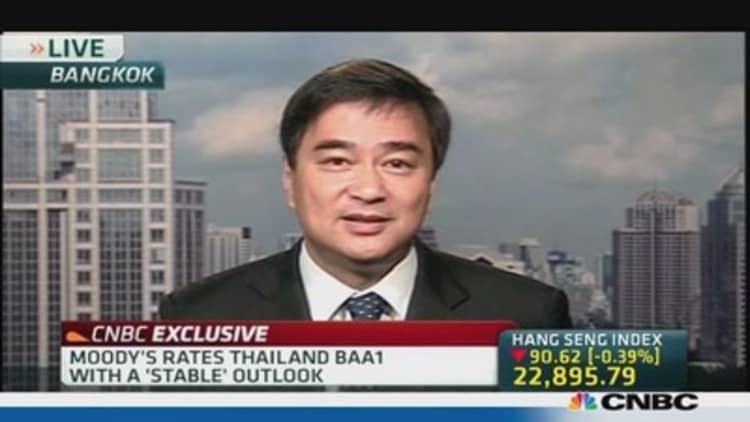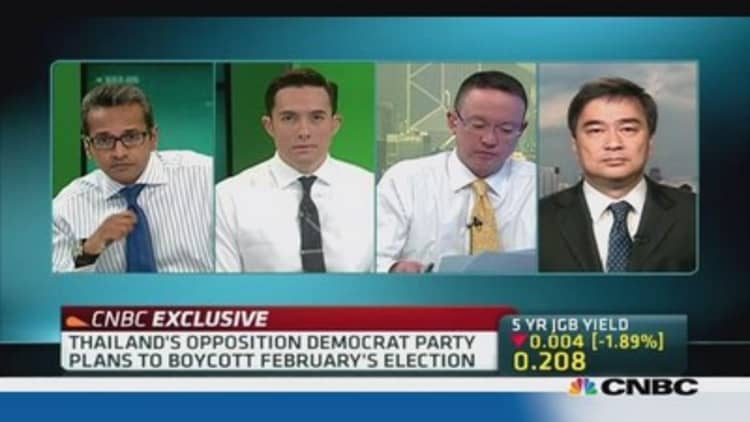
The leader of Thailand's main opposition party is trying to differentiate its positions from the demands of street demonstrations led by his one-time deputy, saying it isn't seeking to suspend the country's democracy.
"The Democrat Party stands nothing to gain from the coup d'etat. (It) stands to gain nothing even if the protestors win. We will not be assuming power. We will not accept any position in power. We do not have anything to gain from violence," Abhisit Vejjajiva, the leader of the Democrat Party told CNBC in an exclusive interview.
"We do not actually mind if we lose fair elections. And we've always accepted election results," he said.
(Read more: Has Thailand's government survived the gauntlet?)
Abhisit wanted to be clear his party's decision to boycott the election, set for February 2 in an unsuccessful effort by Prime Minister Yingluck Shinawatra to defuse the street protests, was not due to widely held expectations she and her party will be swept back into power.
"Even their private polling showed they were slipping. In fact, one poll that was released before dissolution (of parliament) had us ahead. But that's not the point," he said. "The problem occurred because the government betrayed the trust of the people," he said, citing the amnesty bill.
Representatives of the government did not immediately return emails requesting comment.
(Read more: Has the Bangkok shutdown lived up to its hype?)
The protests, which began in late October, were triggered by parliament's consideration of a government-backed amnesty bill that could have allowed former Prime Minister Thaksin Shinawatra, who was ousted in a 2006 coup d'etat, to return home without facing time in prison for a 2008 graft sentence.

Ironically, the bill also would have granted immunity to politicians implicated in 2010 violent protests which killed about 90 people, including Abhisit, who was prime minister at the time, and Suthep Thaugsuban, the leader of the street protests, who was his deputy. Both have been charged with murder.
While the amnesty bill was dropped, the street protests have broadened out to an explicit call for Yingluck, who is Thaksin's sister, to step down. In addition, protesters are calling for replacing their country's democracy with an unelected "people's council" for an undefined period of time.
(Read more: Do Thai protestors have the government in checkmate?)
However, Abhisit wanted to differentiate himself from the protestors' demand.
"We are not proposing the suspension of democracy," he said. "What we are prosing is the government recognize that the Electoral Commission has said the February elections cannot be free and fair. That they step back, invite all sides, open up political space for some kind of compromise so we can move to elections that can be accepted by all sides," he said.
To be sure, the Yingluck government attempted to call a meeting earlier this week of the commission, the protestors and political parties to discuss the timing of the election. Neither the commission nor the opposition leaders attended.
(Read more: Why you shouldn't pounce on Thai shares yet)
In addition, while the Election Commission initially proposed delaying the election in late December, it has since determined that the law does not allow for a change of election date.
"The government needs to reach an understanding with the Election Commission and not invite 60 or 70 people around the table and also people who are just going to come up and say it cannot be done legally,"Abhisit said to explain his party's absence. "If the government meets with the Election Commission, gets the Election Commission to invite political parties around, we would participate."
—By CNBC.Com's Leslie Shaffer; Follow her on Twitter @LeslieShaffer1

